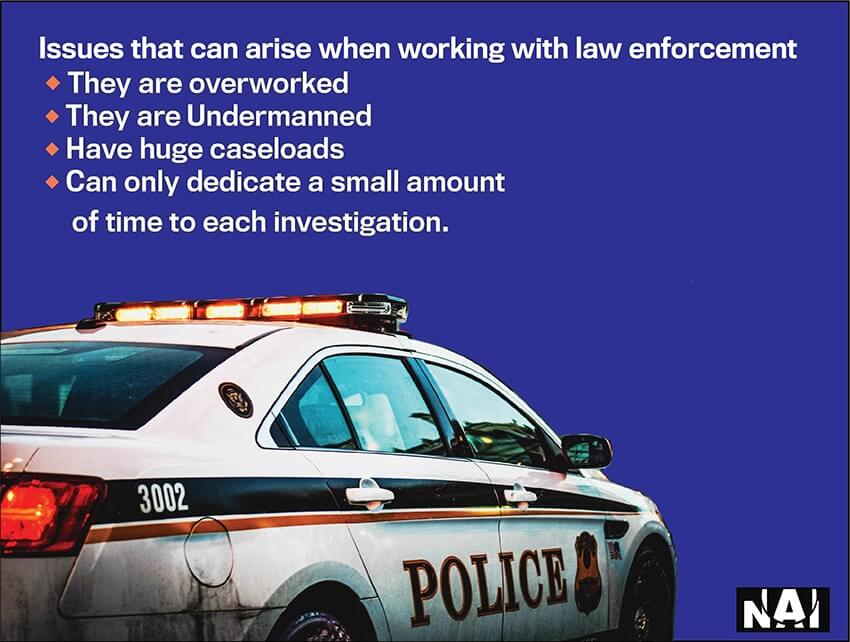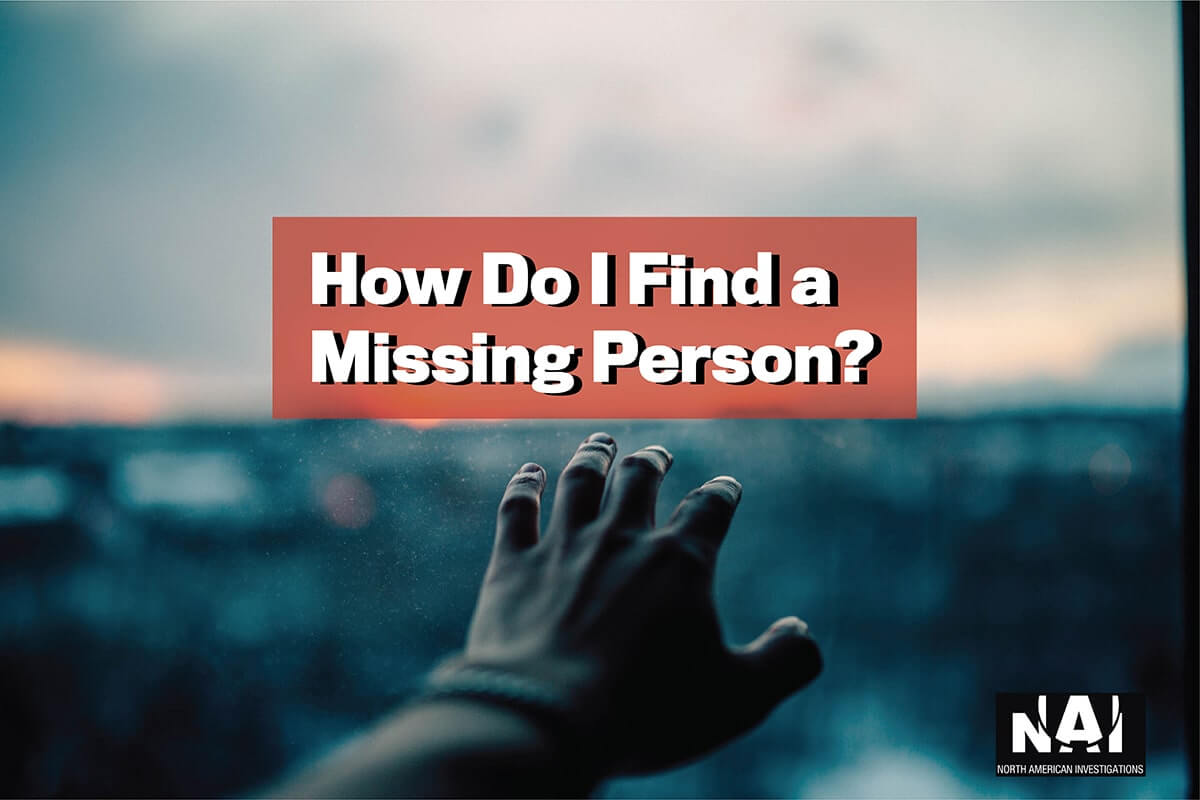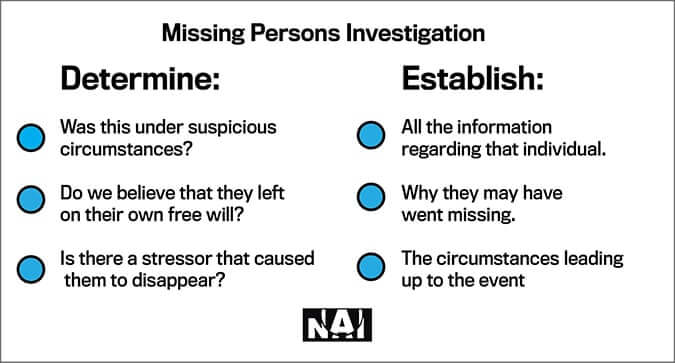Contents
- How do I find a lost or missing person?
- Locate Investigations for ‘Lost’ People
- Missing Persons Investigations
- Conducting Thorough Interviews
- Canvassing
- Utilizing police contacts and informants
- Using the public in a missing persons investigation
- Does that mean we can investigate situations with limited information?
How do I find a lost or missing person?
Every day we get calls from people requesting us to find a lost or missing person. The first thing to do is to differentiate between these two.
Locate Investigations for ‘Lost’ People
A more simple investigation is called a “locate”. This is when you want to contact an old friend that you lost touch with or they moved away and you don’t have their updated contact information. It could be a lost love from the past, or an old college friend. This is what we would consider a locate. You need to find out where they are currently living, get their new contact information, and provide that to the client. We wouldn’t categorize this as a missing person investigation.
You as an individual may be able to investigate or locate somebody yourself. Using the Internet and social media, a lot of times it’s quite straightforward to reconnect with old acquaintances. There’s a lot of public information available to you online.
Missing Persons Investigations
When it comes to a missing persons investigation – it becomes a much more complex and detailed procedure. If there is a missing persons investigation (where you believe someone’s missing) I strongly recommend that you do not take matters into your own hands.
Conducting such an investigation doesn’t necessarily mean that it’s criminal. What it really means to our clients is that person is missing to you. So whatever the circumstances are, we need to investigate. Why did this person disappear?
We need to determine:
- Was this under suspicious circumstances or not?
- Do we believe that they left on their own free will?
- Or is there a cause or a stressor that caused them to disappear or leave?
You need a seasoned investigator that knows how to conduct and utilize the proper steps. Many of the clients who hire us have family members that have either left on their own volition. They’ve disappeared and might be suffering from mental difficulties or illnesses, or drug or substance abuse.
A detailed consultation with a client to ask questions and determine what may have transpired up until the person had gone missing will be key in trying to locate or find them.
Every missing persons investigation is different.
We have to establish:
- All the information regarding that individual
- Why they may have gone missing
- The circumstances leading up to the event.
One of the first steps in a missing persons investigation is to make sure that the person is not hurt or injured. We also want to establish that they’re not in any hospital, any medical facility, the morgue or have been arrested or put in jail.
Conducting Thorough Interviews
The second step is conducting very thorough interviews. The interviews could be done with:
- Family, friends, co-workers, and roommates
- Places where the missing person frequents (such as gyms, clubs, that they belong to)
- Hobbies they’re involved with.
There might be information that a family has. Friends might have other information. Co-workers may be able to provide additional details. And you want to get all the most up to date information from everyone. There may be information out there that one person doesn’t connect to the other person or is not shared information.
Checking social media accounts can be helpful in an investigation. However, in missing persons investigations, a lot of these accounts are no longer used, thus making information getting from them less useful. If an individual is an average social media user and then all that usage stops that is a factor.
You might be able to go back into the history of their accounts to see if you could gain useful leads or information that might be helpful and pointing in the direction of where to look for them.
There are cases where someone goes missing, but they don’t want to be found. If you’re an adult and of sound mind, you have the right to disappear. It still doesn’t make it easier for a family. They still want to have the questions answered. Are they safe? Are they okay? We want to answer those questions.
Canvassing
Canvassing is a technique used in missing persons investigations. Canvassing is visiting locations that are involved in the individual’s life. Canvassing is very important because many times we uncover witnesses that have useful information leads that we can act upon.
We also want to determine how this person gets around. Are they in a car? Are they using mass transit? They say Big Brother is watching, and that is true. But now I say everybody’s brother is watching – as is their sister, mother, and father. What that means is, everybody now has cameras. We have cameras on cell phones, there are security cameras in people’s houses and buildings and all public places. So being able to canvas and look for camera footage or indicators where the person might have been last and build the timeline is very important.
Utilizing police contacts and informants
 Utilizing police contacts and informants is also part of a missing persons case. The police may be investigating your missing persons case or they may not be. It could be a cold case, a case that they looked into, or a case that they haven’t worked on much. In my experience, one of the issues with working with law enforcement is unfortunately, they are overworked, undermanned, have huge caseloads, and they could only dedicate a small amount of time to every investigation.
Utilizing police contacts and informants is also part of a missing persons case. The police may be investigating your missing persons case or they may not be. It could be a cold case, a case that they looked into, or a case that they haven’t worked on much. In my experience, one of the issues with working with law enforcement is unfortunately, they are overworked, undermanned, have huge caseloads, and they could only dedicate a small amount of time to every investigation.
When hiring a private investigator, we’re dedicating the time to find a missing person. So we’re out there actively investigating and putting time and effort to try to find them.
Using the public in a missing persons investigation.
Yes, the public can be beneficial in certain missing person cases, but we do have to be careful because a lot of times when clients are coming to us with a lost family member or missing person. Sometimes these people don’t want to be found. Sometimes they’re suffering from some kind of mental disorders or difficulties or illnesses. We have to be very careful when we’re going to use overt or covert tactics. With any investigation the more information we have, the better the outcome may be,
However…
Does that mean we can investigate situations with limited information?
There are cases where we have little information and they’re able to be solved. And there are cases that we have a wealth of information and sometimes may not be solved. Just recently, I had a situation where a client had hired us. They actually were people that lived in Ireland. Their son, who was suffering from some mental difficulties, was living in England.
He went missing from England, went to Canada, entered the US illegally and was homeless in New York. So there was very little information and go on with this case. We had photos and we had some pedigree information, but this person was not even missing here or from here.
He was in the US but he wasn’t a citizen. We were working with very limited information. This case with limited information was able to be solved. We located him and reunited him with his family. He ended up getting the help that he needed. At the end of the day, reuniting missing people with their families, getting people what help they may need is extremely important.
That’s one of our primary goals and what we look to do with missing persons investigations. Investigating a missing persons case on your own is not recommended. If you have a family member or a friend that’s missing, I suggest you hire a professional private investigator to help investigate the matter.
Are you trying to find a missing person? Call us to see how we can help.






